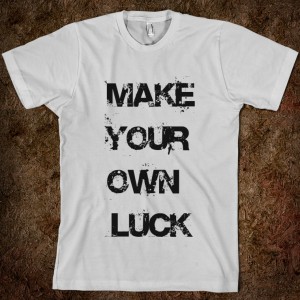You Make Your Own Luck
Friday afternoon I stopped by our local convenience store to gas up. When I went inside, I was surprised to find a sizeable line of people to buy megabucks lottery tickets. I knew about the lottery since it was plastered everywhere but had yet to encounter the fever pitch first hand. The drawing for 650M was in a few short hours. Showing the same wildly irrational hope, I bought a few tickets.
We don’t have much control over whether we win the lottery, but it turns out, we have control over what we perceive as “luck,” and we have a great deal of control over our own happiness by how we interpret events and situations. When events occur we choose whether we believe they happened to us, or we caused them to happen. Bronze medal winners consistently self-describe themselves as happier with the result than Silver medal winners. Because they are not celebrating the facts, but interpreting counter-facts. They are answering the what-if question, and Bronze medal winners are celebrating that they are on the podium, while Silver medal winners are disappointed they lost.
Here’s another example of how we look at the world. In Daniel Kahneman’s book, he describes a bank survey in which they asked two separate questions:
- How much would you pay for $100,000 life insurance that will pay in the event of death for any reason?
- How much would you pay for $100,000 life insurance that pays in the event of death by terrorist attack incident?
Survey respondents said they would pay much higher rates for the second type of life insurance. This is deeply irrational but speaks directly to how negative emotions and ideas have the ability to cause us to overvalue or over emphasize their likelihood because of our emotional response to the idea.
In Richard Wiseman’s book The Luck Factor, he describes luck in terms of choice. In his research working with over 400 individuals he found some key attributes of those who describe themselves as “lucky.” These are the four big points in the book:
They consistently have chance encounters that lead to interesting new possibilities and opportunities
Lucky people harness the power of curiosity well. They are creative and curious, and everyone can learn to be too. Wiseman has a fun game you can play in which you write down six activities or experiences you have not tried but would be willing. Write them down and then roll a die and go do it.
They make good decisions without consciously knowing why or how they did
Those who describe themselves as lucky make better gut decisions. Which seems impossible to control, yet Wiseman discovered this is a learned trait since he found that those lucky decision-makers actually spent more time reflecting and meditating on the decision once considered, and spent more time envisioning hypothetical circumstances they might have to decide on. So when the situation arose, those lucky were better prepared to make a decision in the moment.
Their dreams and ambitions have a knack of coming true
Lucky people expect the best outcomes, despite any negative past experiences, whereas unlucky people allowed past negative events to dictate future expectations. The lucky people also described their expectations of upcoming interactions with other people as generally positive.
They regularly turn their bad fortune into good luck or opportunity
Wiseman describes two primary ways people turn bad luck into good. Basically they interpret the bad as “could have been much worse.” And when they reflect, they spend a greater amount of time visualizing and selectively remembering the positive. Other words, the bad wasn’t all that bad, and the good was pretty great.



